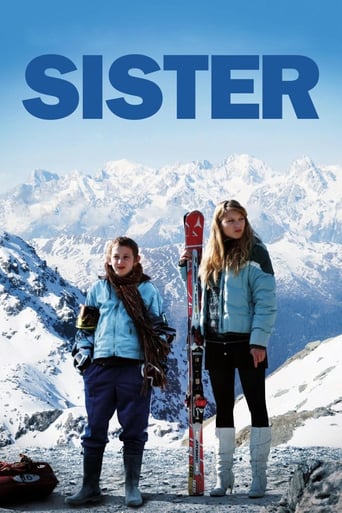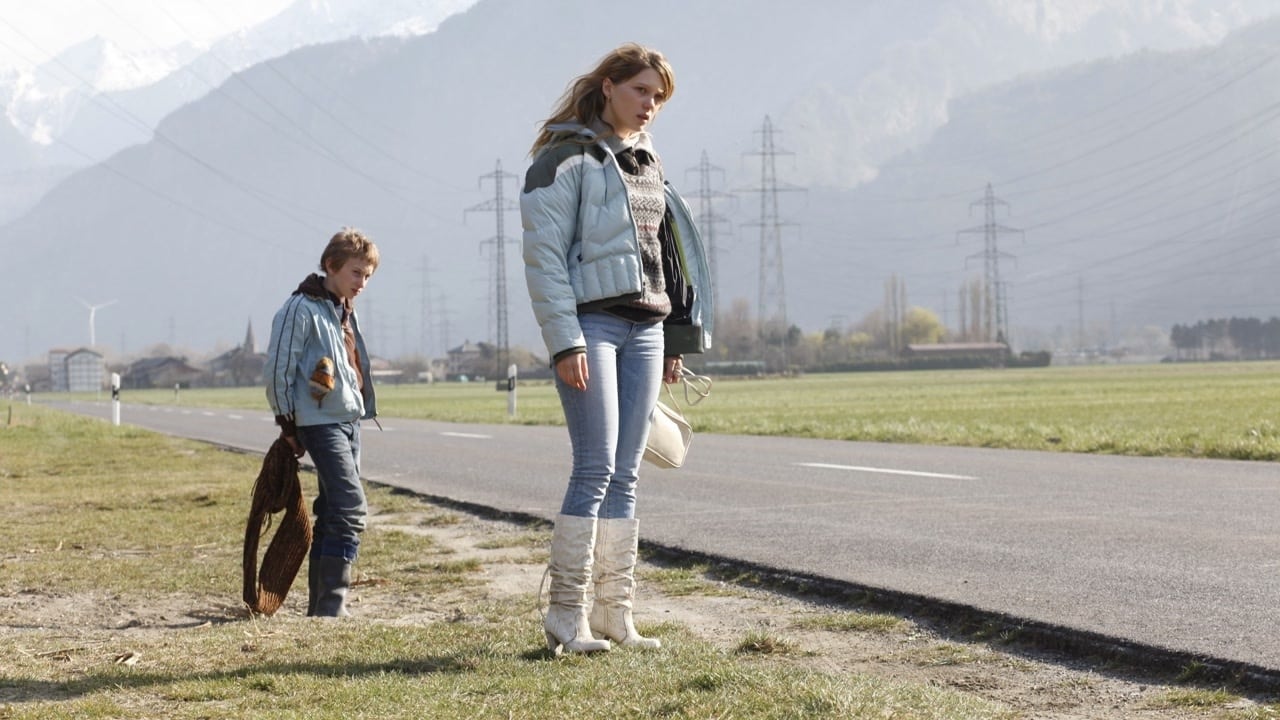krocheav
I was attracted to this story by a synopsis that described it as a moving experience. In typically modern French Indi' fashion, it ambles along so slowly at times you want to run at 2 x speed. There's little to be truly moved by unless your attracted to a story about a young 12 yr old lad who steals from anyone who gives him half a chance - in order to keep his drunken, immoral mother (who looks ridiculously just a few years older than him) in food and designer clothes. Her character is never explored so we know nothing about her, making it difficult to engage with her problems. No-one seems to mind the fact the kid never seems to go to school or have any family - they just seem to accept that he hangs around the ski lodge all day, every day. With all the major thieving he constantly performs (super expensive ski equipment and clothes) it's too much to think no-one would have suspected him right off. Well acted with some OK photography this has been somewhat overrated and while it may please those who tend to look at - but don't fully examine what drives a story - it's left somewhat lacking. You may well have seen far worse but, also far better.
Sindre Kaspersen
French-Swiss screenwriter, actress and director Ursula Meier's second feature film which she co-wrote with Swiss sociologist, author and screenwriter Antoine Jaccoud and French author and screenwriter Gilles Taurand, is inspired by an idea from the director. It premiered In competition at the 62nd Berlin International Film Festival in 2012, was shot on location in Switzerland and is a France-Switzerland co-production which was produced by producers Denys Freyd and Ruth Waldburger. It tells the story about a 12-year-old boy named Simon who lives in an apartment block in an industrial area nearby a ski resort in Switzerland with his older sister named Louise. As his sister spends most of her time with her various boyfriends, Simon innately thinks that it's his responsibility to support them so he frequently finds his way to the ski resort up in the mountains where he steals equipment and sells it to the tourists.Distinctly and precisely directed by French-Swiss filmmaker Ursula Meier, this quietly paced fictional tale which is narrated mostly from the two main characters' viewpoints, draws a humane and heart-wrenching portrayal of a somewhat uncommon relationship between two siblings. While notable for its naturalistic and surreal milieu depictions, fine cinematography by cinematographer Agnès Godard, costume design by costume designer Anna Van Brée and excellent choice of location, this character-driven story about a boy who meets and Englishman and who breaks moral rules in desperation, for the sake of achieving affection from the person he cares the most for and to make that person happy, depicts two interrelated and heartrending studies of character where two human beings who are marred by their backgrounds does what their hearts and minds tells them to do and contains an efficient score by composer John Parish.This conversational, political, at times humorous, non-moralizing and tangible though imaginary psychological drama about interpersonal relations, communication and human conditions which is set in the Swiss Alps during a skiing season and where a child who keeps on going up to a place where people are living a lifestyle that is far away from his and keeps on coming back down to his reality where things are not quite as sunny, has taken on the role as provider due to the situation he and the only person he has is in, is impelled and reinforced by its cogent narrative structure, subtle continuity, good dialog, emotional substance and the prominent and commendable acting performances by child actor Kacey Mottet Klein and French actress Léa Seydoux. An atmospheric, somewhat sociological and affective love-story which gained, among numerous other awards, a Silver Bear Special Award at the 62nd Berlin Film Festival in 2012.
twilliams76
Switzerland's entry for Best Foreign Language film (it will or won't be nominated come Thursday morning although it has already been announced as one of the Top 9 contenders by that organization) is about young Simon and his older sister who live in a housing complex at the base of a mountain housing a luxury ski resort/chalet.Simon (Kacey Mottet Klein) steals from the rich customers who have so much they are none the wiser and his sister Louise (Lea Seydoux) wanders aimlessly from man to man looking for a possible guy to take them both into his life.It is an honest, unflinching composite of poverty and survival and Mottet Klein does an outstanding job in his role as someone who takes chances because he has nothing (or everything) to lose. Seydoux again impresses (this time in an un-likable role) as her Louise is one who needs to grow-up and learn a thing or two; but without knowing much of where these two came from we cannot fault either of them too much. Gillian Anderson (The X-Files, The House of Mirth) shows up in a few scenes as an English tourist Simon wishes to impress but this story belongs to brother and sister.We are all so quick to judge but oftentimes we know nothing of what we are talking about. Sister asks us to take a glimpse of another life and imagine ...
videoblomov
Ursula Meier's "Sister" is not an easy film. A boy, Simon, survives in the fringe of a mountain –and of society-, stealing from the visitors of a skiing resort. His only companion, quite unreliable, is an older sister, Louise, whose ups and downs force Simon to act way above is age. We don't know anything about how they ended up in this situation, though at midpoint of the film we'll learn the truth of their relationship. The background and the weather are as cold and unpleasant as the relationships portrayed, while the deadpan style of the film makes not a single concession to sentimentalism. Under these premises, Meier has built a forthright movie full of subtleties: not an easy film, but utterly rewarding.Other reviewers here have already pointed out the duality of this high/low setting, brilliantly used by Meier. It mirrors the class distinction, of course, and their respective environments: the white, unspoiled snow on top of the mountain for those with money, against the melted mud on the hillside where the underprivileged survive. Simon, however, doesn't look for the wealth of the mountaintop. Surely, he strives for an improvement in his life, but his stealing is merely practical –he needs to buy food, toilet paper-. No, what Simon yearns for is tenderness, for a caring mother, for a life in which (the lack of) money doesn't spoil relationships. Downtown, Simon has to be on permanent watch out; up in the resort, he can still pretend to be a kid.This fight against loneliness drives both siblings. What Louise cannot find in Simon, she looks for in random boyfriends. What Simon cannot get from Louise, he tries to get from a woman he stalks at the resort. However, those relationships are built upon lies that hurt each other, driving them further apart.Needless to say, Simon won't fare well; eventually, his pretense falls when the woman he wants as a mother finds him cleaning her cabin: Simon can't any longer hope to be her son if he is just a chalet bellboy. To make things worst, he's caught stealing the woman's wristwatch. Was his stealing a betrayal, a payback for her rejection? Or was he taking a souvenir, a keepsake of the mother he lacks? It comes to my mind a little essay by Jean Genet, "L'Enfant criminel" where the author points out the symbolic value of the crime's object in the mind of the young criminal. It is not surprising, therefore, that the watch he has stolen is found on his crotch. Still following Genet, what turns someone into a thief is not the act of stealing, but the word "thief" directed at him. The word, the injury, is what creates the separation from society, a separation that will lead to the development of a criminal moral and the eventual transformation into a thief. Simon struggles to elude this process, while at the same time is doomed to it.At the end of the film Simon returns downtown, accepting the place where he belongs. There's no other possible direction for him: once that the snow melts at the resort, there's no tenderness to be found there. Probably, as one character says, Simon will steal bikes through the summer. Nothing has really changed for him; he'll keep surviving at the margins of society. But, in this hopeless ending, there's the hopeful note too. Simon is going down, yes, hanging inside a cable car, when he crosses another cable car that goes up. His "sister", obviously worried, calls for him. These siblings, after all, do care for each other, and that's something that the lack of money cannot change. They are not alone.



 AD
AD



